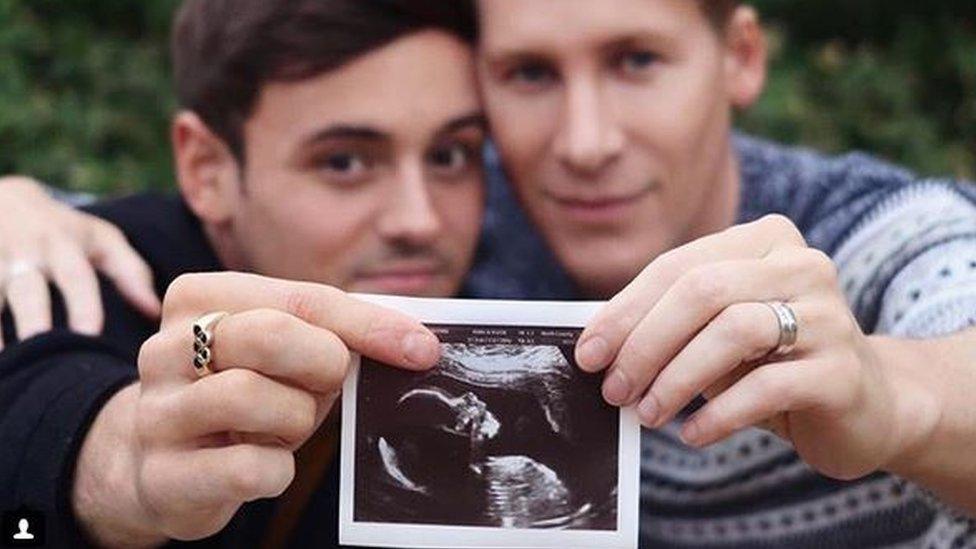Dustin Lance Black: A childhood of love and fear
- Published
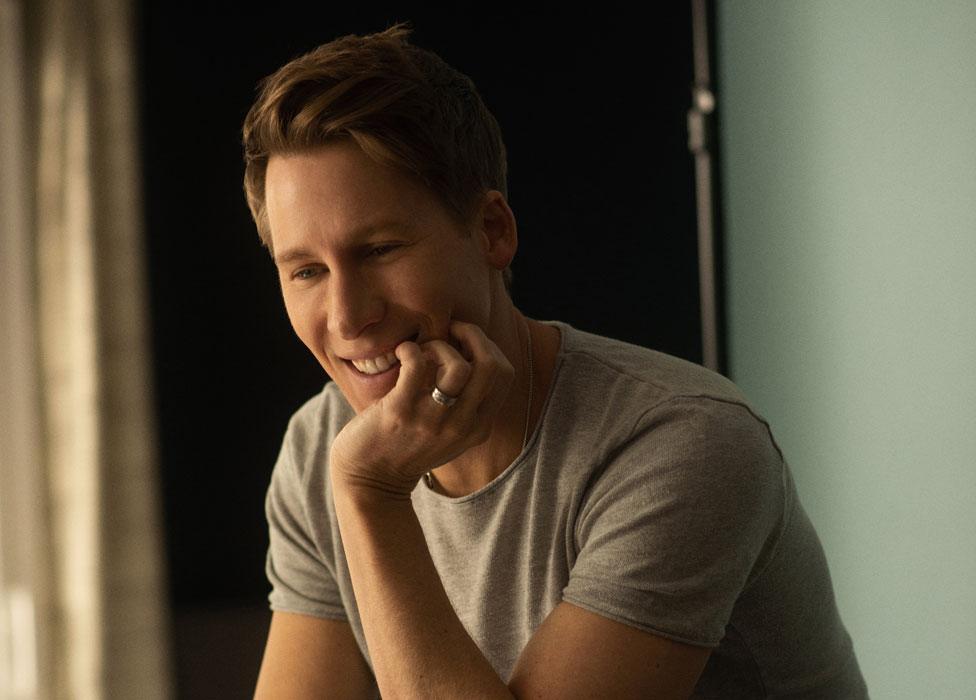
In Britain, Dustin Lance Black is known as the man who two years ago married Olympic diver Tom Daley. But Black was already an Oscar-winning screenwriter.
Before that he survived a difficult upbringing, growing up gay and Mormon in Texas in a military family.
Now he's recounted the early years in his memoirs, Mama's Boy, which reveal a lot about his personal life. But Black insists he's only a supporting player alongside his mother Anne.
"Mom came from what has been called the poorest place in America - Lake Providence, Louisiana. She was born on the south side of the Mississippi which was mainly African American and even poorer than the rest.
"Then at two years old she got polio. Mom was paralysed from the chest down and that sent her into children's hospitals."

Tom Daley and Dustin Lance Black married in 2017
Black's pride in his mother's ability to beat the odds is obvious.
After a successful career in army medicine she lived long enough to see the beginnings of his love for Daley, although in his 20s Black had feared her reaction if she ever discovered he was gay. He's now 44.
What helped Anne escape hospital and find a career was joining the Mormon church.
"When Mom was a teen these very cute young men came through in their pressed white shirts and their little badges.
"They were Mormons and they promised an eternal family for her and a healthy body. Mom had always been told she wouldn't work, couldn't marry or have kids. She converted at 19 or 20.
"And Mom married her first husband who was of course a Mormon and that's why her three sons were raised Mormon."
Poverty and Anne's violent second husband (from whom Black gets his surname) feature large in Mama's Boy. There's romance too but from the age of six Black knew he was gay.
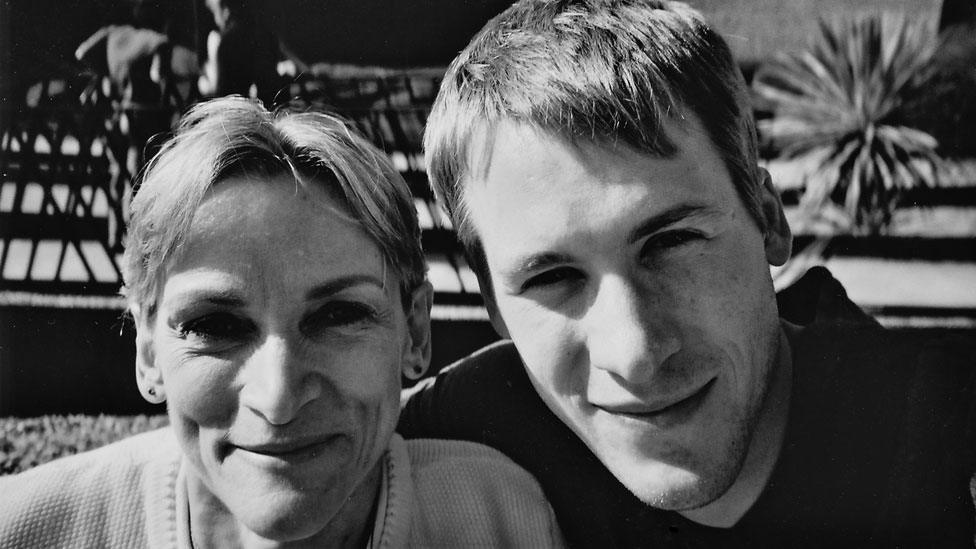
Black and his mother Anne: "I was raising her as much as she was raising me"
"I had all the information to know how much trouble I was in. I was a Mormon and we were a military family in Texas. I had heard the word homosexual inside the Mormon church and the Prophet (church leader) at that time was saying it was a sin akin to murder.
"So I had heard lots of colourful words, almost all pejorative, about these feelings that I had for this kid down the block.
"Whatever little butterflies I had in my stomach turned to terror within seconds. I was going to hell and I would bring shame to my family."
'Truly terrible'
The result was that he more or less stopped talking. "Probably I believed that when I was silent I was invisible and I'd be safe."
It's not the only point in our conversation where Black cries. But a happier thought emerges. "It's like when now Tom and I play peekaboo with our son Robbie: when he's silent I'm sure he thinks we don't see him."
It would be easy for Black to condemn Mormon culture entirely but he never does.
"When I was a child I was devout: that has long gone but I felt it honoured Mom that I try in the book to find something good in the church. Although for me there were truly terrible things in it.
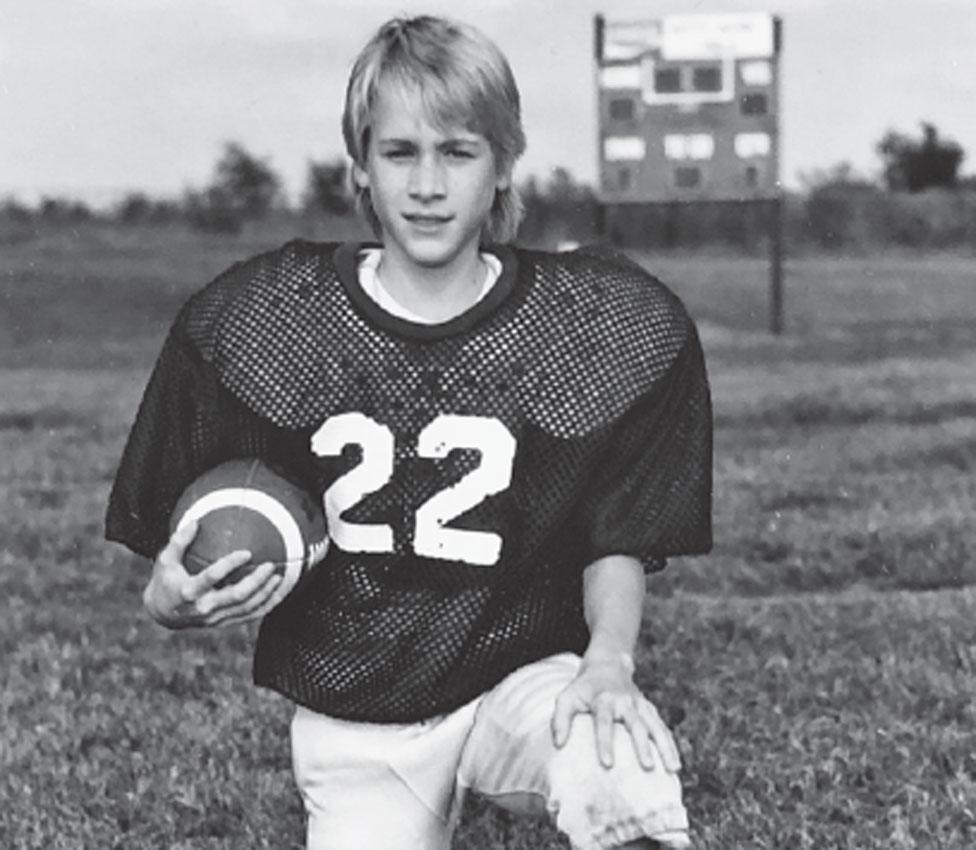
Black, pictured in 1987, was a keen footballer
"Outside the home I didn't want to exist: I wanted to disappear. But I loved my Mom so much and even at six years old I knew I was raising her as much as she was raising me - we didn't have a father at that time.
"So I couldn't do what so many do and take their lives. But certainly I didn't think I could ever excel or achieve anything."
The Dustin Lance Black the world knows now is likeable, successful and hyper-smart.
He's adept at playing a good-natured support role in Daley's social media. But when he talks about the past you sense remembered emotion coursing through him. He didn't tell anyone he was gay until he was about 20.
As his book recalls, the years before were filled with fear, anger, pretence and sadness.
Building bridges
Black says there was no specific coming out with his mother. "By now we had moved to Salinas, California and the summer before I came out my best friend came out to me. So we used to visit West Hollywood and suddenly I was meeting gay people.
"I was leading this strange new life where for the first time I wasn't telling Mom about everything I was doing. When I left home for college I'd been calling Mom three times a day and that had just stopped.
"Mom got very heated about the new government policy of Don't Ask, Don't Tell. In her view it was going to allow closeted gay people into her military and she was really against it... she just assumed I agreed with her opinions.
"I started to pray that I wouldn't cry. Because I didn't want to lose Mom: she was my best friend. But my prayer wasn't answered and my Mom saw my tears and she knew. So I never had to say the words.
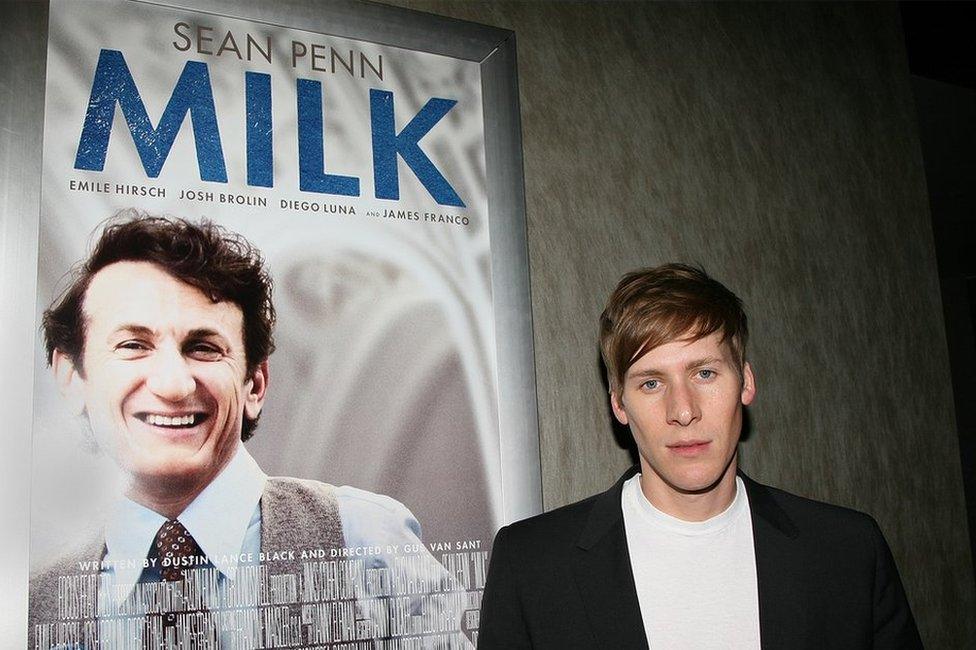
Black won an Oscar for Milk, which starred Sean Penn
"I could see how horrible she thought it was and how scared she was for me. She asked me why I'd chosen this life. And I did something I only ever did twice in my life: her crutches were next to her and I said Mom why did you choose those?
"Eventually my courageous Mom did something we do all too rarely. She got on a plane and she came to see me in LA - this place where we'd always been told sinners lived.
"She came to see my gay friends. And it was that visit which started to build bridges."
In 2008 he won an Oscar for his screenplay for Milk about the politician and gay rights campaigner Harvey Milk.
Then he wrote for the TV series Big Love, which focused on Mormon characters, and the screenplay for J Edgar, starring Leonardo DiCaprio.
More recently he created the mini-series When We Rise, about the fight for gay rights in America.
But for several years Black concentrated more on campaigning. He became involved in the fight against Proposition 8, a ballot initiative in California which took away the existing right to same-sex marriage.
Allow X content?
This article contains content provided by X. We ask for your permission before anything is loaded, as they may be using cookies and other technologies. You may want to read X’s cookie policy, external and privacy policy, external before accepting. To view this content choose ‘accept and continue’.

"Writing about Harvey Milk I realised his success came from coalition-building: I could see what stories we would need to tell and who we needed to talk to." The measure was later thrown out by a court in California.
'Doing what we love'
Black worries that a mood of conservatism in America threatens to reverse some advances in civil rights.
He says any civil right is always under threat. "But it's work that feeds the soul. The prize is to lock arms and fight back together."
Home now is London with Daley and their son Robbie, who will turn one in June.
So how does it feel being half of the best-known gay married couple in Britain?
Allow Instagram content?
This article contains content provided by Instagram. We ask for your permission before anything is loaded, as they may be using cookies and other technologies. You may want to read Meta’s Instagram cookie policy, external and privacy policy, external before accepting. To view this content choose ‘accept and continue’.

Black frowns. "Well don't tell Elton John that. Tom and I have never claimed to be perfect, whatever that means in a relationship.
"We're not trying to be anyone's example. We're living our lives and building our family and doing what we love.
"We also made a decision to be open about ourselves and who we are and that opens you up to scrutiny.
"But it felt important particularly for our son - we never wanted him to feel we were hiding anything out of shame."
Sometimes Black features in Daley's very active social media presence. So does he go along willingly with this supporting role?
"I always know what Tom's YouTube videos are going to be about and I could just say, 'no I'm not playing'. But they're good fun.
"Though there was one where he had me try to dive off a 10-metre platform and two-and-a-half million people have seen me chicken out."
For now Black and Daley are concentrating on parenting skills.
"I helped raise my younger brother so I knew the basics. But even so I'm still thinking when I do something that this could be formative for him - I'd better get it right and not screw up. He's our son, he's our child."
Mama's Boy is published by John Murray.

Follow us on Facebook, external, on Twitter @BBCNewsEnts, external, or on Instagram at bbcnewsents, external. If you have a story suggestion email entertainment.news@bbc.co.uk, external.
- Attribution
- Published20 May 2019
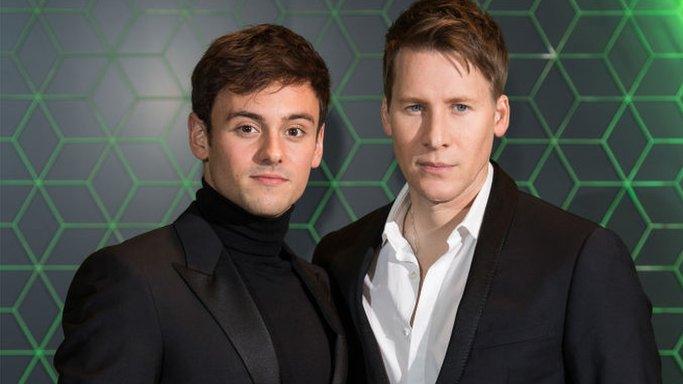
- Published30 June 2018
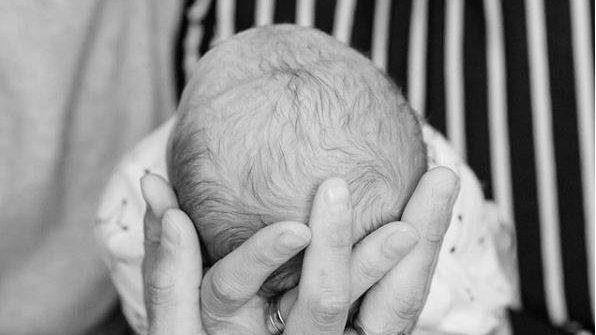
- Published14 February 2018
